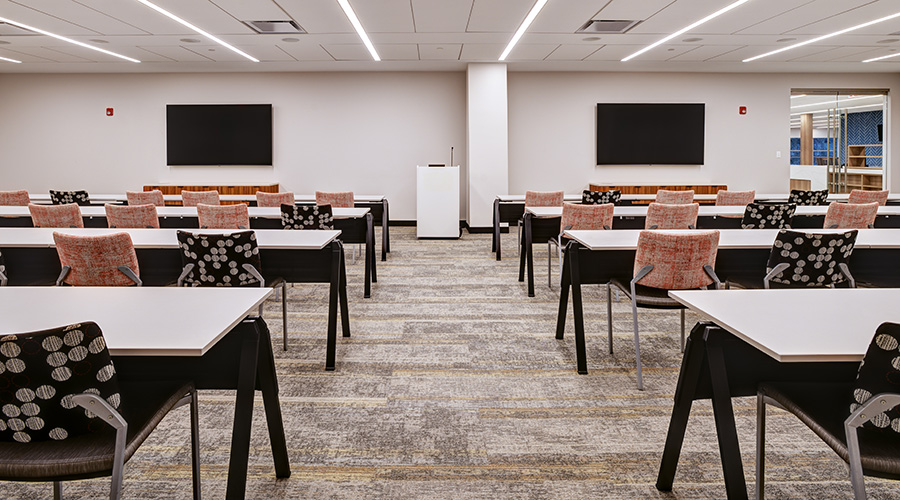The Overlooked Key to Tenant Retention in Commercial Real Estate
Engineers and maintenance personnel play an essential role in commercial facilities.
By Henry Asante, Contributing Writer
Commercial office real estate faces unprecedented vacancy rates driven by two significant factors: federal government mandates through the General Services Administration (GSA) reducing leased square footage in both government-owned and rented public properties, and the COVID-19 crisis that accelerated workplace transformation. As remote work demonstrated its viability with productivity levels remaining stable or improving, companies increasingly view traditional office space as optional rather than essential, creating a challenging market reality for property owners and investors.
Commercial office building owners must fundamentally reimagine their tenant attraction and retention strategies. As the prospective tenant pool contracts, building owners face intensifying pressure to differentiate their offerings. This extends well beyond providing premium amenities or generous concession packages. The approach requires comprehensive innovation, drawing inspiration from the hospitality industry's customer-centric model.
The shrinking tenant market has created fierce competition, necessitating building owners to adopt hospitality-industry principles for customer acquisition and retention. Each property must develop a distinctive identity that clearly differentiates it within the marketplace.
While these initiatives have merit, they often miss the most critical element: the tenant's actual experience within the building. This includes customer service quality when interacting with building amenities and staff. Some forward-thinking owners have created resolute community manager or amenities manager positions, redistributing responsibilities previously assigned to property managers. This allows property managers to focus more attention on tenant relationships, which is a strategic improvement.
However, this approach consistently overlooks a critical component of the property management ecosystem: the building engineers and maintenance technicians. This group remains an afterthought despite their significance.
The engineering and maintenance team represents the most tenant-facing segment within building operations. They respond to service requests while maintaining building systems, addressing everything from HVAC issues and water leaks to indoor air quality concerns. I've observed firsthand that approximately 80 percent of tenant-facing interactions are handled by maintenance personnel, yet they receive minimal training in customer service and communication skills. Tenant satisfaction surveys frequently show competent engineering and maintenance teams outperforming property administrative staff in all ratings categories. Building engineers that possess effective communication skills often establish valuable relationships with tenants through consistent service delivery and reliable communication protocols.
If communication is indeed critical to tenant satisfaction, why do we neglect the group most engaged in this vital function? The undervaluation of engineering and maintenance communication skills isn't deliberate. While engineering staff needn't engage across all communication channels involved in property operations, they should excel in tenant-facing interactions, particularly in today's tenant-centric environment.
The fundamental issue is that communication skills essential for tenant satisfaction aren't incorporated into standard technical training programs for engineering staff. Their professional development typically focuses exclusively on safety protocols and technical capabilities. One cannot reasonably expect proficiency in skills never taught or emphasized. The hospitality industry has mastered training every team member regardless of role to provide welcoming, respectful and service-oriented communication that creates memorable guest experiences, thereby building customer loyalty and attracting new business.
The impact of engineering-focused communication on building operations can no longer be marginalized. In today's competitive market, we must deliberately enhance engineering teams' communication capabilities through targeted training and leveraging existing tools like computerized maintenance management systems (CMMS) to create optimal communication outcomes.
An effective training program begins by helping engineers and maintenance teams understand that their communication effectiveness with tenants directly impacts retention rates more than ever before. They must be integrated into tenant experience strategies from inception rather than as an afterthought. The training should cover all scenarios where engineers interact with tenants, providing clear guidance on appropriate communication approaches. Such training should be mandatory, with outcomes monitored and measured through mechanisms like tenant satisfaction surveys.
In today's challenging commercial office market, leveraging every competitive advantage is essential. Building engineers and maintenance staff represent an underutilized asset in tenant satisfaction and retention strategies, one that forward-thinking owners and managers would be wise to develop.
With 19 years of engineering experience across multiple roles, Henry Asante currently manages the seamless daily operations of a diverse and large portfolio of Class A commercial buildings spanning over 3 + million square feet of office space in Washington DC. Serving more than 3,000 commercial tenants, he ensures all facilities run without disruption. He has established effective protocols that foster collaboration and operational excellence. Drawing on his extensive background, Henry directly oversees operations while offering expert consultation to engineering staff on critical systems including HVAC, MEP, fire life safety, automation, security, and OSHA compliance, ensuring all buildings maintain optimal performance and safety standards.
Related Topics:












